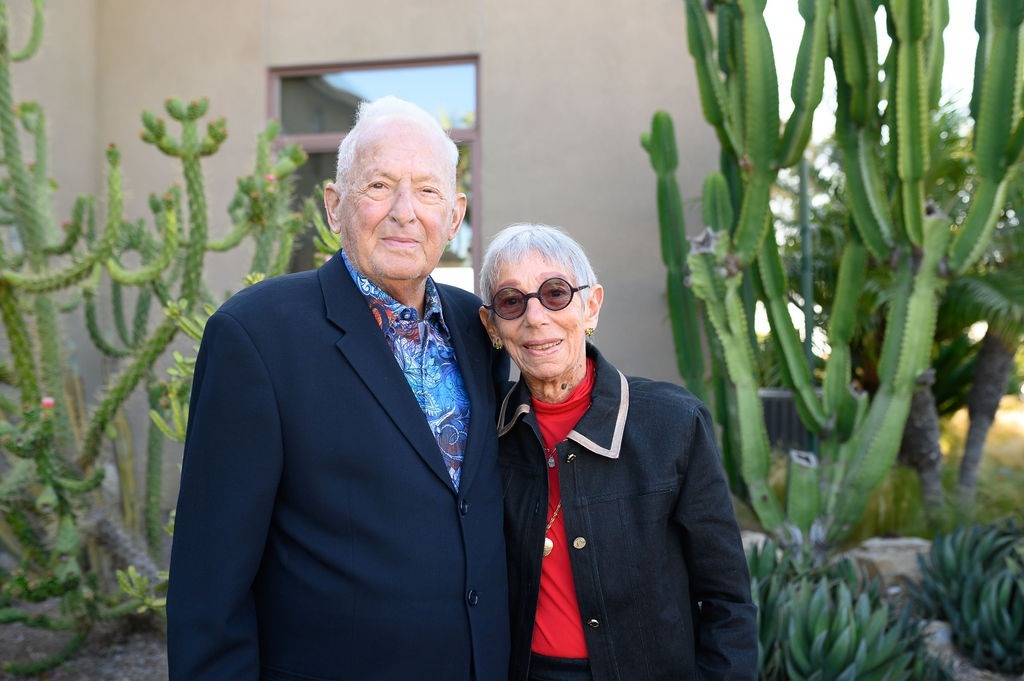Meet Norma & Werner Dreifuss: A Lifetime of Resilience, Love, and Giving

Allow us to introduce you to Seacrest Village residents and long-time Seacrest Foundation supporters, Norma & Werner Dreifuss.
Werner was born in Germany in 1931 and, because of the unsettled times between the two world wars, grew up in a succession of orphanages. His mother had been a victim of the economic devastation in Germany between the wars and eventually lost her life in a Nazi concentration camp. Fortunately, as a mere 5-year-old, his caregivers in the kosher Jewish orphanage in Germany were nurturing people who cared for him until the infamous Kristallnacht (Night of Broken Glass) in 1938, when German stormtroopers and Nazi youths attacked all things Jewish. He was a frightened 8-year-old who was somehow chosen to be with others fleeing to France. In France, he was fortunate to be the recipient of the generosity and diligence of the OSE (Society for Assistance to Children) and secured a place on a train bound for Eaubonne, a few miles outside Paris. There, he was housed in a chateau that had been the home of the wealthy American DuPont family and was now a Jewish refugee orphanage, either loaned or rented to the OSE. As German troops readied to enter Paris, Werner and others miraculously secured places on a train bound for Limoges. There, the children stayed at Chateau Montintin, another orphanage for Jewish refugee children. Food was scarce, and the children hunted for berries and climbed the orchard trees for apples. Rabbit was the only meat available. However, it was a wooded area and a great place to play, so Werner’s memories were bolstered by childhood games and frolicking without the terror of air raids and Nazi Street violence.
In 1940, Werner was among the first 100 children issued visas on the Kindertransport—the first transport to America before the U.S. entered the war. Others who supported the effort to rescue Jewish children and deserve credit were Marshall Field of Chicago, the Quakers of America, and Eleanor Roosevelt. So, at age 10, Werner left on the Portuguese ship Mouzinho for America, his new country, with a third language to learn. On the voyage, the food was plentiful and delicious, but there was a constant fear that Germany might declare war on Portugal, putting the ship at risk of attack by German submarines. Once in America, the orphans were dispersed throughout the United States, and Werner was sent to Los Angeles, where he was bused to his new orphanage, Vista Del Mar. There, all the children were available for adoption or foster care. Werner was taken in by a couple who owned a cattle ranch in Chula Vista to “replace” a son who had recently died—not an enviable position to be in! Once again, through patience and gratitude for what he did have, Werner flourished on the ranch, helping with farm chores, raising his own calf, riding horses, and showing livestock at the local fair. He was never adopted by his foster family, but they were kind and instructed him in ranching skills that served him well. He was also lucky to have a sixth-grade teacher who mentored him, helped him learn English, and assisted him in dealing with the bullying of classmates. Throughout the trials of a difficult life in hazardous times, there had always been a person or an organization that offered hope and encouragement, as Werner tells it. Although he didn’t have a keen interest in high school, with the war raging in Korea, he realized he would be exempt from military service if his grades were good. He began studying, received all A’s, and earned a scholarship from Sears and Roebuck. In 1950, he enrolled at Cal Poly as a student in dairy husbandry. This began a new phase of life judging cattle.
As an adult, Werner was finally able to make his own decisions and shape his future. That future took a turn in 1953 when he was introduced to Norma by beloved former Seacrest resident and well-known San Diego cooking instructor and chef, Edie Greenberg z”l. Norma, a Los Angeles native, was attending UCLA when she and Edie met at breakfast and discovered they both kept kosher. One thing led to another, and after learning that Norma’s parents had moved to Coronado, Edie invited Norma to San Diego for a weekend. She said she had someone she wanted to introduce Norma to, it was Werner! One year later, in 1954, they were married. What a good choice it was to court Norma and win her over for the last 71 years. Norma is a treasure that he most readily acknowledges.
In 1955, Werner was drafted into the army and so began their first two years together on army bases, where he gained more experience in personnel, leases, and insurance to add to his previous knowledge of buying, selling, and ranch business. By 1957, the cattle business in South Bay and San Diego was dying, and he needed to make another change. He was hired by Teller’s Discount Store and, in 1960, became the manager of Teller’s store in Chula Vista. During this time, he and Norma had three sons and moved to a larger home in Point Loma. When Teller’s closed, Werner and an associate bought Teller’s Annex and renamed it the Bargain Center. When his partner wanted to sell his share in the business, Werner bought it, and at age 31—just 21 years after coming to America without a penny in his pocket—he was the owner of his own business and now the father of a daughter to add to his three sons. In 1964, Norma and Werner and their four children moved from Point Loma to a quieter, warmer climate in the College area.
In 1975, with the kids in college or high school, it was time for Norma to pursue her career. Having majored in business administration and fashion design, she worked full-time in the ladies’ department at the new Bullock’s Department Store in Mission Valley. There, she won numerous awards and a trip to Hawaii for her outstanding customer service. Norma had always dreamed of being the next Edith Head. She entered numerous competitions and even wore bangs and big round glasses to look like her. She created all her children’s outfits and her maternity clothes and enjoyed her career at Bullock’s until her retirement in 1992.
In the 1980s, Norma and Werner had been eyeing the new homes being built across the freeway in the Del Cerro Heights community. This new phase had 20 homes that were going back to the bank, and after several negotiations, they were able to secure the model home that they fell in love with. The home was completely finished, including wallpaper and appliances “timing is everything,” according to Werner. The Dreifuss’s enjoyed the next several decades in Del Cerro, watching their family grow to now include eight grandchildren and two great-grandchildren. They have enjoyed traveling on over 130 Crystal Cruises, including many around-the-world cruises.
In 2024, Norma and Werner embraced another change, moving to Seacrest Village, where they now reside. Longtime supporters of Seacrest Foundation they have attended annual galas and 211 Club Patron parties and have generously contributed vital funds. Their support includes purchasing Seacrest’s first electric vehicle, which helps transport residents to appointments and significantly reduces the organization’s gas costs. They see first-hand all the wonderful care that is provided to the residents. Norma has been enjoying many of the activities offered through the Life Enrichment programs such as bead making and she loves walking around the campus. She takes loving care of Werner, making sure he drinks sufficient water, giving her input into his stories and making him feel valued. If they aren’t out taking a stroll around campus, you might find Werner enjoying the koi pond out on the DAVS patio. Many of their friends are residents and they enjoy making new friends. They enjoy many of the amenities, especially not having to cook or clean anymore. Norma says it’s like being on a cruise ship that doesn’t go anywhere. They both believe in “giving it back” for the wonderful life they have lived and are generous in their support of Seacrest and many more charities.
Werner wrote a book, The Epitome of the American Dream. It is a fascinating memoir written especially for his progeny but of great interest to anyone interested in a firsthand account of the Holocaust, being a child of the Kindertransport, San Diego history from the 1940s to today, and the psychology of winning at life.
Seacrest Foundation extends heartfelt thanks to Sandy Scheller and Elana Schiff for authoring this tribute to our beloved Norma & Werner Dreifuss. We also join in celebrating Werner’s incredible journey and wish him a very happy 94th birthday on March 12, 2025.


